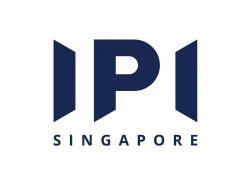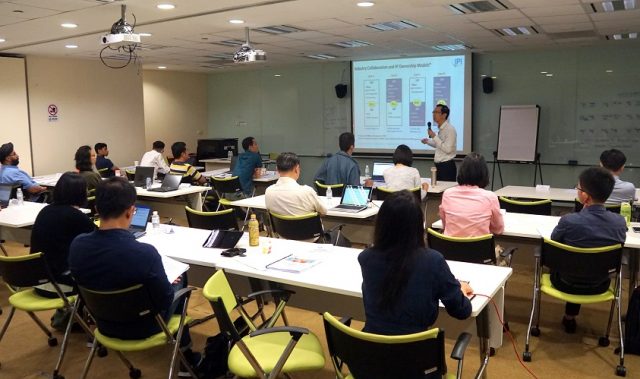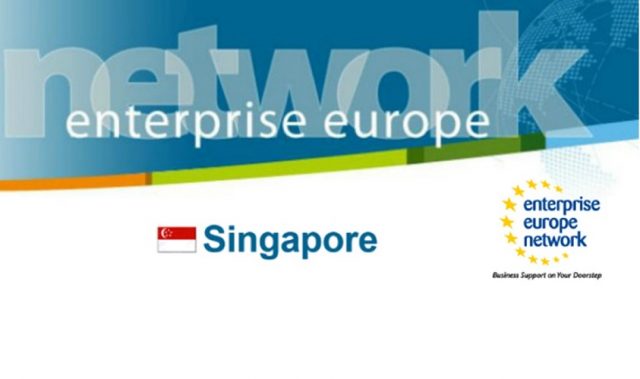
AsianScientist (Feb. 18, 2021) – In the fast-paced world of innovation, intellectual property (IP) can be considered its currency. Similar to how financial systems govern the way money is exchanged, IP rights like patents provide value and protection to groundbreaking innovations. By ensuring control over their invention’s commercial use, inventors are typically recognized and rewarded for their efforts in the form of licenses and the like.
Not only that, but patents can also spark innovation. After all, patent filing requires inventors to provide a detailed explanation of how their invention works, with this information freely available online. The information can then be used as a seed for new ideas, and eventually, patents—creating a cycle of innovation. Unsurprisingly, patents are a key factor in propelling some of the world’s most valuable and innovative companies—like Apple and Amazon—to success.
To encourage start-ups to harness the valuable IPs of established industry players to generate new business ideas, the IPHatch open innovation challenge is held yearly in Singapore and Hong Kong. Organized by IPI, Enterprise Singapore and IP bank Piece Future, this year’s IPHatch was launched on 9 December at TechInnovation 2020. Here are a few key highlights from the launch.
Setting up for success
Kicking off the launch of IPHatch was Jason Loh, who gave the opening remarks. As CEO and founder of Piece Future, Loh was well exposed to the vast spectrum of IP found across Asia. In 2017, Loh “hatched” the competition after seeing the need to help companies in the region realize the benefits of using IP to grow their businesses.
“This platform has created over 30 start-ups,” he shared. “These start-ups continue to inspire me with their innovative ideas and drive every day.”
Beyond fueling the growth of promising companies, IPHatch also encourages start-ups to use the innovative technologies at hand to also benefit the wider society, especially in a post-COVID world.
“I would like to encourage (companies) to make use of this tough climate to make something that is meaningful and impactful,” added Loh.
Start-ups in Singapore have much to gain from the country’s pro-business environment, Loh continued.
“We have a very open and cosmopolitan culture, a diverse talent pool and well-established infrastructure, ranging from venture capital networks to accelerators and incubators that can support you in your journey,” he said.
Moreover, Singapore’s IP regime is consistently rated as one of the best in Asia and around the world. All these factors, combined with initiatives like IPHatch, should help local start-ups thrive and succeed in the years to come.
A win-win scenario
In a fireside chat moderated by Esther Wee, IP Counsel at Henry Elias Partnership LLP, three start-ups from IPHatch shared how the competition had shaped their own innovation journeys.
Consider the case of Tagvance, a Singapore-based start-up that provides automated workforce tracking services for construction sites, mines, seaports and shipyards. Before taking part in IPHatch, Tagvance had been using manual tags and radios to track workers in particular settings, said founder Can Kiral.
Hoping to enhance their product offering, Tagvance turned to a patent from IPHatch partner Nokia—a trailblazer in the telecommunications industry. The patent allowed Tagvance to develop thermal sensors for location positioning. With these sensors, even workers without tags could be monitored, complementing their existing portfolio of tag-based tracking.
The acceleration of lengthy and complicated patent processes is another key benefit of IPHatch, said Junho Cho—CTO and co-founder of EC Bento, a company that operates artificial intelligence (AI) temperature-controlled bento vending machines across Hong Kong.
According to Cho, he had spent a year developing a patent in Korea before devoting another year and a half to get the patent. Similarly, in Singapore, it took him another year to be granted a local patent and three years for an international patent. Through IPHatch, however, within just one month, Cho and EC Bento received valuable IP from Nokia—significantly expediting their product development timeline.
Alexander Ying, founder and CEO of AI health and fitness company DRESIO Ltd, agreed with Cho’s sentiments.
“We realized that the process is actually really complicated—from writing the patent, verifying it and hiring a lawyer. For an early-stage start-up, that was something we had to sit down and talk about a lot and evaluate,” he said. “Getting a ready-made active patent was more effective for us.”
Turning plans into patents
To conclude the fireside chat, the speakers shared sound advice to this year’s IPHatch participants. For instance, Ying is firm that tailoring ideas to the patent is a key factor to finding success through IPHatch. By doing so, companies can increase the value of their portfolio and improve their existing products in an innovative manner, with the backing of an established company.
“Take a look at all the technical documents for the patents you’re interested in, (then) customize your idea to the patent,” he advised.
Staying true to Loh’s vision, IPHatch has indeed come of age as one of the key innovation platforms in Asia. Armed with a strong IP portfolio, collaborations with leading industry players and funding through IPHatch, the sky’s the limit for start-ups in the region.
Asian Scientist Magazine is a content partner of IPI.
———
Copyright: IPI. Read the original article here.
Disclaimer: This article does not necessarily reflect the views of AsianScientist or its staff.












